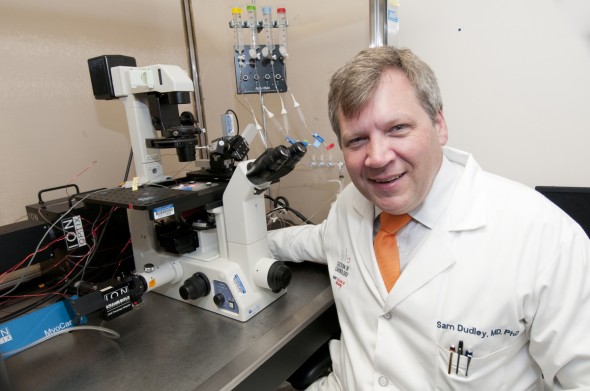Developing a blood test for heart failure

“We’re not just developing a diagnostic test — it’s also the start of a therapeutic process,” says Samuel Dudley, professor of medicine and physiology.
Photo: Roberta Dupuis-Devlin/UIC Photo Services
Through its Proof of Concept Gap Funding Initiative, UIC’s Office of Technology Management provides awards of up to $75,000 to UIC researchers who have technology disclosures on file with the university. Four research projects received funding in July and more projects will receive funding this fall.
Most hospital admissions are for heart failure, says researcher Samuel Dudley.
It’s critical for physicians to determine what type of heart failure a patient has: systolic, where the heart fails to contract properly, or diastolic, where the heart doesn’t relax properly.
“They have the same symptoms. Both are deadly,” said Dudley, professor of medicine and physiology in the College of Medicine and chief of cardiology at UI Health.
“Right now, it’s a diagnosis of exclusion — that is, you rule out all of the other causes,” he said.
About six months ago, Dudley’s research team — which includes Euy-Myoung Jeong, research assistant professor in cardiology — discovered a protein marker that can be measured in the blood, pointing to systolic or diastolic heart failure.
From this, the researchers invented a blood test to determine which type of heart failure a patient is experiencing. They are conducting clinical trials with patients who go to the hospital experiencing shortness of breath, since that is a primary symptom of heart failure.
There’s only one blood test on the market that can diagnose heart failure, and no other blood test pinpoints the specific type of heart failure, Dudley said.
“If we can tell who’s short of breath and why, that takes care of about 1 million people per year who present with shortness of breath,” he said.
Dudley’s team plans to expand the research findings to developing therapies for heart failure.
“We’re not just developing a diagnostic test — it’s also the start of a therapeutic process,” he said.
Read about the research projects:
